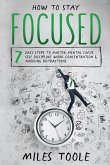Sometimes it seems like every time you sit down to work, another email alert dings on your phone, or another roommate barges in with some kind of ramen disaster. Busy people have to suffer lots of distractions, and learning to negotiate them can be a challenge. But it doesn't need to be. You can learn to prioritize tasks and find the things that demand your attention the most, then plan for knocking the most important things off your to-do list by minimizing distractions. Part 1 of 3: Prioritizing Tasks 1. Write down everything you need to do. If you're feeling overwhelmed, stressed, and unfocused, making a list is the easiest and quickest way to simplify and help you plan an attack. To learn what you need to focus on now and how to put everything else in the background, make a list of the things that are pressing on your mind. ¿ Short-term tasks should be things that are urgent. What needs to be done today, or by the end of the week? You decide the time frame, but try to keep it as urgent as possible. ¿ Long term goals are also important, but only if you translate them into a list of specific shortterm things that you can do. If ""Become a doctor"" is on your list of long-term goals, and is stressing you out, it's not something that you're going to be able to make happen before lunch.
Hinweis: Dieser Artikel kann nur an eine deutsche Lieferadresse ausgeliefert werden.
Hinweis: Dieser Artikel kann nur an eine deutsche Lieferadresse ausgeliefert werden.









